Origin concept constantly feels like it’s about to fall off a cliff
If the game ever gets its act together and promoted the series properly, State of Origin could be this country’s Super Bowl: a rare event that transcends code wars.

It’s around this time of year when you start hearing the same familiar complaints about State of Origin: it lacks hype, it’s gone soft, it’s killing the NRL premiership, it’s dying a slow, inglorious death.
The remarks usually come from NSW-based rugby league media who have run out of things to write, frustrated that no Blues players will “light the fuse” by feeding them a line about Queensland, who seize upon the smallest of insults and plaster them all over the dressing-room wall.
Oh really? Origin is dying? Good as XXXX Gold.
Then the series gets underway and Origin preoccupies the consciousness of two states for six weeks. Last year’s gripping decider at Suncorp Stadium, which NSW eventually won 14-4, is considered one of the toughest, fastest and most skilful games in recent memory.
If the game ever gets its act together and promoted the series properly, State of Origin could be this country’s Super Bowl: a rare event that transcends code wars because even those who don’t enjoy or understand rugby league can still indulge in the primal joy of large, athletic men running at each other at great speed.
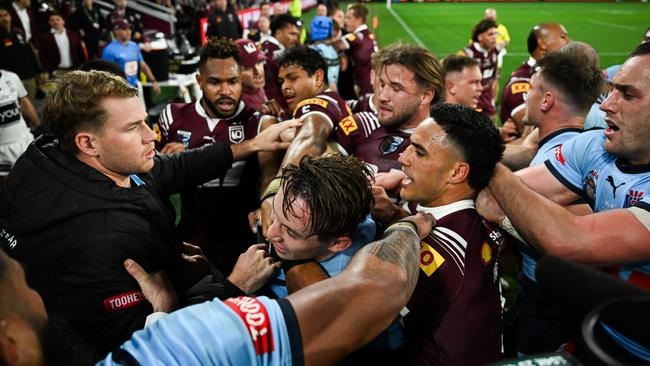
As it stands, Origin still goes all right: no annual sporting event on these shores commands as much national attention outside of the AFL grand final.
Last year, more than 10.2 million viewers watched the three-match series, with the decider the most watched since Game I in 2016.
Two million of last year’s viewers came from Victoria, South Australia and Western Australia – a 20 per cent increase since 2021. More than 1.1 million of those came from Victoria, which has the fastest-growing rugby league participation rate in the country, although admittedly it’s coming from a low base. It’s one of the reasons the Melbourne Storm were so miffed about the NRL snubbing them for next year’s season-opening matches in Las Vegas.
Last year, 90,084 people attended Origin II at the MCG, even though it’s the worst venue in the country to watch sport that is played on a rectangular field.
More than 500,000 people in Western Australia – the home of the Perth Bears franchise that enters the NRL in 2027 – watched last year’s series.
In 2022, 59,358 people filled the 60,000-seat Optus Stadium and a similar crowd is expected for Game II this year with ticket sales, 28 per cent ahead of where they were three years ago.
Despite this, the Origin concept constantly feels like it’s about to fall off a cliff, divided by two bubbling issues: the loosening of eligibility rules to accommodate players who want to play for NSW or Queensland but not necessarily Australia, and whether the on-field rules applied week-to-week in the NRL should be different to those in Origin.
For the opening 20 years of Origin, which was first played in 1980, the series was a genuine selection trial for the Australian team, mostly because Test matches were often played mid-season. Then the NRL started to change. For some time, about half the competition has consisted of Pasifika players, some of whom have allegiances to their parents’ countries of birth while also having a passion for the state in which they played their junior football.
Under the rules, players eligible for Samoa, Tonga, Fiji, and Papua New Guinea can play for their state and their country because the International Rugby League considers them to be “tier-two” nations. NSW prop Payne Haas and Queensland opposite Tino Fa’asuamaleaui have played for Australia but are tipped to switch allegiances to Samoa later in the year. Fa’asuamaleaui has already played a match for the Pacific nation.
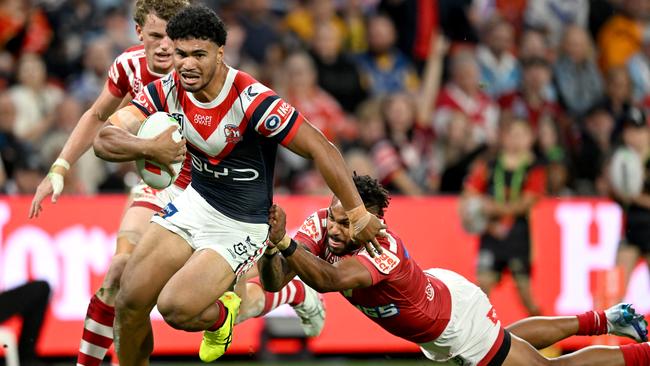
Players who want to play for “tier-one” nations such as England and New Zealand, however, are forbidden from playing Origin – a rule many people argue should change.
Queensland centre Robert Toia, who makes his debut in the series opener in Brisbane on Wednesday night after playing just 10 NRL matches for the Sydney Roosters, is the perfect test case. He was born in New Zealand, has Tongan heritage and was raised in Redcliffe just north of Brisbane from the age of six. He played under-19s for Queensland in 2022. If he decides to play for Tonga, he can still play for Queensland. If he decides to play for New Zealand, he cannot.
The factor few want to talk about is match payments because it doesn’t fit into the syrupy Origin narrative about fighting for the honour of one’s state.
Under the collective bargaining agreement struck in 2023, Origin players receive a whopping $30,000 per game.
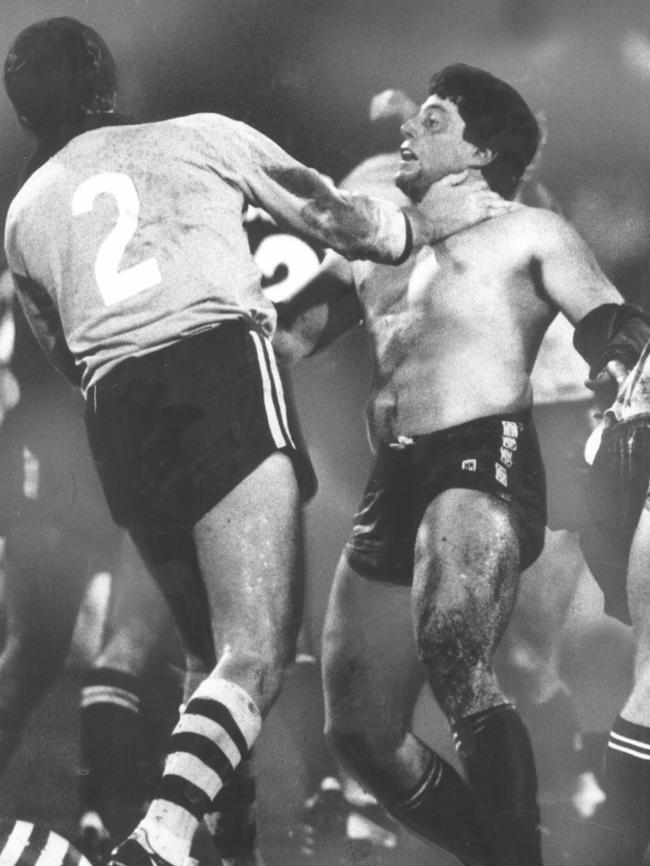
They deserve every cent given the spectacle they put on and the revenue the series raises, but it does become an issue for the strength of international rugby league. Money usually wins.
Retired firebrand Gorden Tallis regularly says on NRL 360 he would play for Queensland for nothing. Few modern-day players are built that way. He revelled in the Origin arena because he could impose his physicality in every tackle, the most famous coming in 2002 when he grabbed jockey-sized fullback Brett Hodgson by the collar and swung him like a rag doll over the sideline.
Under the NRL’s chaotic rule interpretations and match-day officiating, he would probably be penalised or sent to the sin bin.
Aggression is one of the main reasons non-rugby league followers tune into Origin, even if a legitimate punch hasn’t been thrown in years.
Canberra coach Ricky Stuart, a former Blues halfback who won series as a player and coach, raised a valid point about aggression after his side’s tough win over the New Zealand Warriors in Auckland on Sunday.
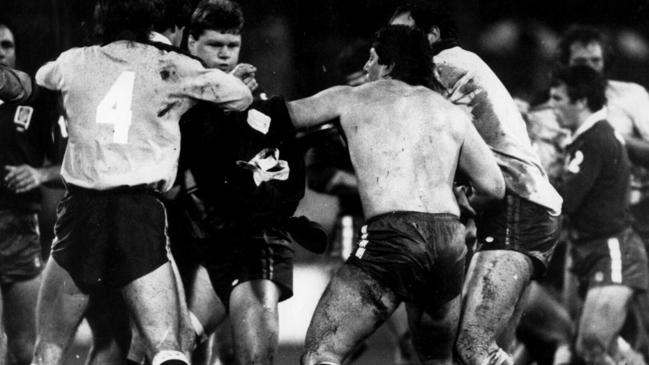
“We keep getting told this game is about entertainment and that was an entertaining game tonight, but you can’t discipline aggression,” Stuart said.
“Our game and our broadcasters promote aggression. We’ve got to be real careful that we don’t scrutinise aggressive actions in the game that is moulded on real aggression and passion. On Wednesday night we’ve got one of the most special games in our calendar. The profile and the passion of Origin is through aggression.”
Former NRL chief executive Dave Smith, a merchant banker, banned punching in Origin in 2013 when a school principal sent him an angry letter after NSW captain had whacked the prodigious chin of Queensland niggler Nate Myles, who had been slyly headbutting players in tackles with impunity for several series.
When a melee erupted in the first half of last year’s decider, spilling from the field and into the Queensland bench, it made for great theatre, but not a single punch was thrown.
“I’m looking for players being aggressive,” referee Ashley Klein told Bunker officials.
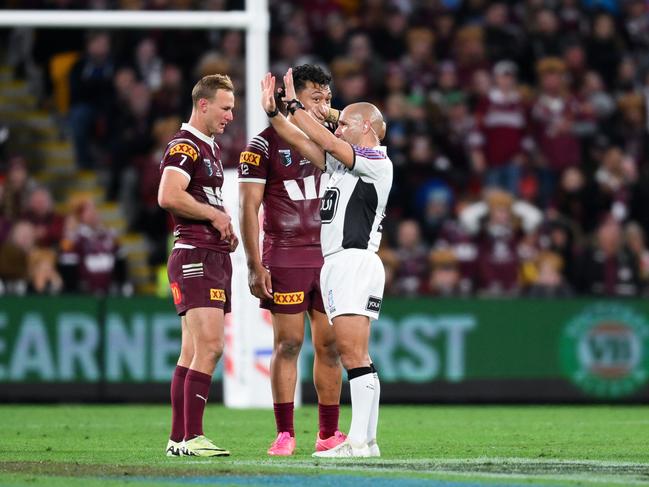
Minutes later, he sent Maroons backrower Jeremiah Nanai and Blues lock Cameron Murray to the sin bin for rushing in – a big no-no in rugby league, even though players would be mocked if they didn’t support their teammates in a fight, even when it’s not a fight, and especially so in Origin.
Some of the thunderous hits in last year’s series, particularly the third game in which the 120kg Haas was occasionally bent backwards, demonstrates you can be aggressive without being a thug.
The line is blurred, though, when the forearms and shoulders of defenders start collecting ballcarriers in the head.
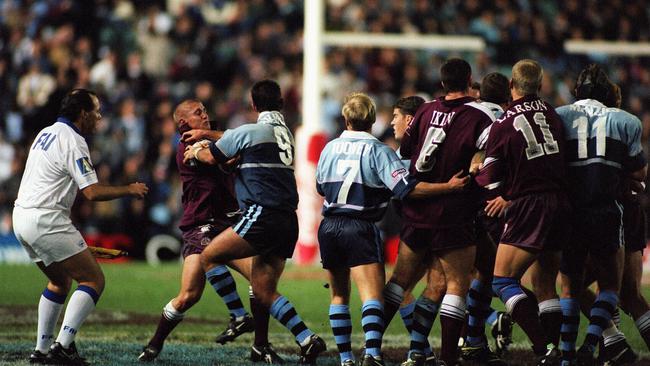
That’s when Klein, who has been appointed for the opening match this year, needs to work out if a player should be sin-binned or sent off – and if that threshold changes because it’s Origin?
Many argue it should, even if it undermines the NRL’s claims it’s tough on contact with the head. The interpretation has changed so many times in the past few seasons it’s hard to keep up.
Let’s see what Klein does when Blues replacement prop Spencer Leniu, perhaps the most hated man in Queensland right now, comes on after 20 minutes and runs at the teeth of the Maroons defence at a raging Suncorp Stadium.
So, in summary, Origin hasn’t gone soft. It isn’t dead. And, once the first ball and/or head is kicked in anger on Wednesday night, it won’t be lacking hype.
Origin promotes itself.


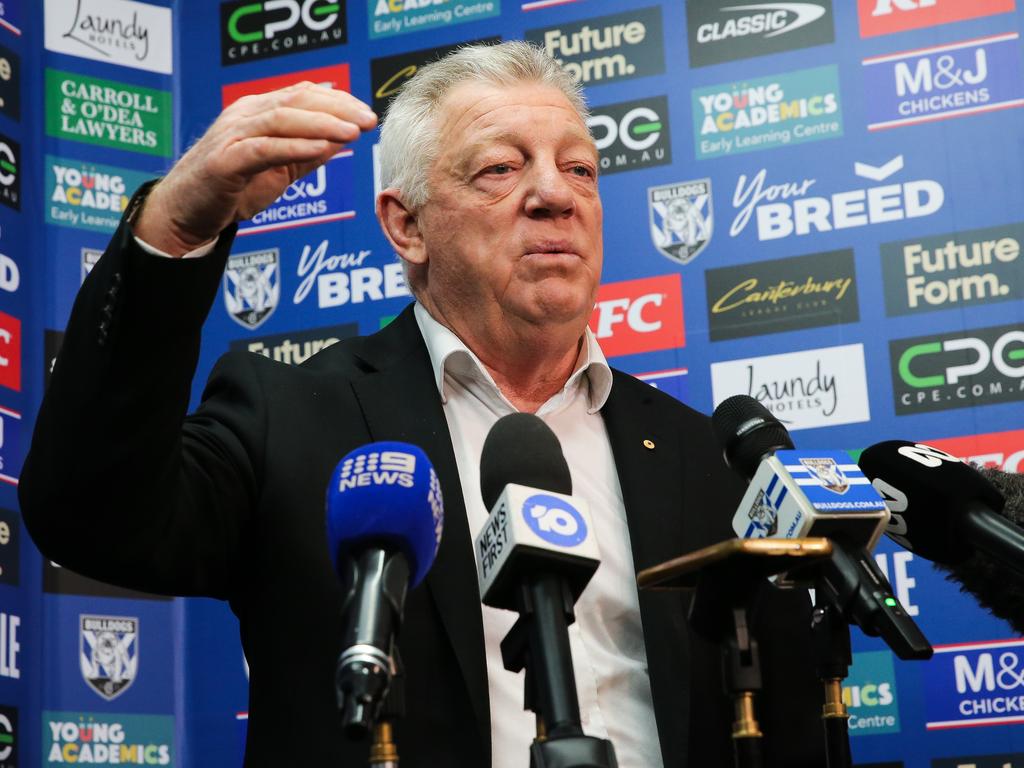

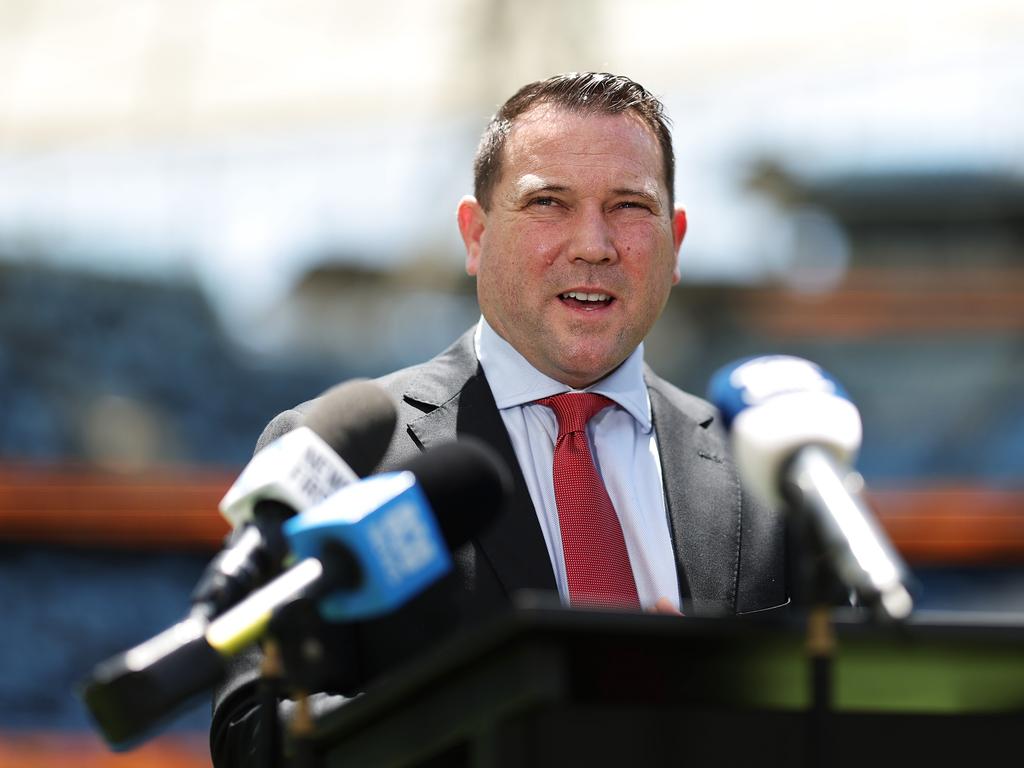


To join the conversation, please log in. Don't have an account? Register
Join the conversation, you are commenting as Logout